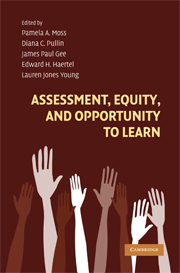Book contents
- Frontmatter
- Contents
- Preface
- List of Contributors
- ASSESSMENT, EQUITY, AND OPPORTUNITY TO LEARN
- 1 Introduction
- 2 Assessment Through the Lens of “Opportunity to Learn”
- 3 A Sociological Perspective on Opportunity to Learn and Assessment
- 4 A Sociocultural Perspective on Opportunity to Learn
- 5 Individualizing Assessment and Opportunity to Learn
- 6 Cultural Modeling as Opportunity to Learn
- 7 Opportunities to Learn in Practice and Identity
- 8 Game-Like Learning
- 9 Sociocultural Implications for Assessment I
- 10 Issues of Structure and Issues of Scale in Assessment from a Situative/Sociocultural Perspective
- 11 Sociocultural Implications for Assessment II
- 12 Assessment, Equity, and Opportunity to Learn
- Index
- References
1 - Introduction
Published online by Cambridge University Press: 05 June 2012
- Frontmatter
- Contents
- Preface
- List of Contributors
- ASSESSMENT, EQUITY, AND OPPORTUNITY TO LEARN
- 1 Introduction
- 2 Assessment Through the Lens of “Opportunity to Learn”
- 3 A Sociological Perspective on Opportunity to Learn and Assessment
- 4 A Sociocultural Perspective on Opportunity to Learn
- 5 Individualizing Assessment and Opportunity to Learn
- 6 Cultural Modeling as Opportunity to Learn
- 7 Opportunities to Learn in Practice and Identity
- 8 Game-Like Learning
- 9 Sociocultural Implications for Assessment I
- 10 Issues of Structure and Issues of Scale in Assessment from a Situative/Sociocultural Perspective
- 11 Sociocultural Implications for Assessment II
- 12 Assessment, Equity, and Opportunity to Learn
- Index
- References
Summary
The most pressing issue facing U.S. education may be providing all students with a fair opportunity to learn (OTL). Although most would embrace the goal of enhancing OTL, there are fundamental disagreements about how best to accomplish this and different understandings of the meaning of “opportunity to learn.” Historically, conceptions of OTL have been closely tied to the practice of testing. OTL has been conceptualized as opportunity to learn what is tested, and test-based accountability has been widely implemented as a means of enhancing OTL. In the United States, policy makers have embraced test-based accountability as a means of somehow forcing schools to bring “all children” to a “proficient” level of achievement. By law, tests must be “aligned” to rigorous “academic achievement standards.” Thus, standardized tests are relied upon to provide both the definition of successful learning and the means to assure that OTL is extended to all learners. Against this vision, many have criticized the conception of learning underlying large-scale testing programs and have argued that test-based accountability has, in fact, undermined many students' opportunities to learn.
It is rare to find any productive dialogue between the critics and the proponents of test-based accountability systems. By and large, testing advocates embrace a straightforward account of educational improvement. It is taken as a given that schools are doing a poor job – the goal of schooling is to impart skills to students, and it is common knowledge that many students graduate without having acquired the skills they need.
- Type
- Chapter
- Information
- Assessment, Equity, and Opportunity to Learn , pp. 1 - 16Publisher: Cambridge University PressPrint publication year: 2008
References
- 13
- Cited by

